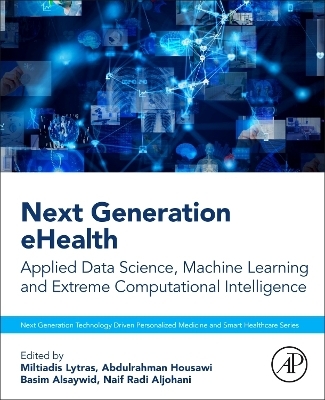
Next Generation eHealth
Academic Press Inc (Verlag)
978-0-443-13619-1 (ISBN)
Miltiadis D. Lytras is an expert in advanced computer science and management, with extensive experience in academia and the business sector in Europe and Asia. He is a Research Professor at Deree College—The American College of Greece and a Distinguished Scientist at King Abdulaziz University, Saudi Arabia. Dr. Lytras specializes in cognitive computing, information systems, technology-enabled innovation, social networks, and knowledge management. He has coedited over 110 high-impact special issues in ISI/Scopus-indexed journals and authored more than 80 books with international publishers. Additionally, he has published over 120 high-impact papers in top-tier journals such as IEEE Transactions on Knowledge and Data Engineering and the Journal of Business Research. With 25 years of experience in Research and Development projects, Dr. Lytras has been involved in more than 70 R&D projects globally. He holds senior editorial positions in prestigious journals and is the Founding Editor and Editor in Chief of the International Journal on Semantic Web and Information Systems. Dr. Abdulrahman Housawi is a Nephrologist and Specialist in multiorgan transplant surgery and Chairman of the Multi-organ Transplant Research Committee at King Fahad Specialist Hospital, Dammam, KSA. He received his medical degree from the King Abdulaziz University in Jeddah, Saudi Arabia, his Master of Science degree with a focus on epidemiology and biosta?tistics from the University of Western Ontario, London, Canada, and a Master of Science in Health Administration from the University of Alabama, Birmingham. His research interests include the epidemiology of chronic kidney disease, developing research registries for CKD and solid organ transplants, the outcomes of living kidney donation and the long-term outcomes of kidney transplantation. From the PH-LEADER workshops, he hopes to further his knowledge of transplants and outside aspects of surgery and its effects on the donors and their families. Currently, he is responsible for the development and implementation of the Saudi Commission’s strategy, including its transformation to a data-driven organization (2016epresent). Basim Alsaywid, Pediatric Urology Surgeon, graduated from King Abdulaziz University then completed Saudi Board of Urology in 2007. He obtained his Pediatric Urology Training Certificate from a fellowship at Westmead Children Hospital and then Sydney Children Hospital at Randwick, Sydney, Australia. During his fellowship training, he completed his Master of Medicine degree from the University of Sydney in Clinical Epide?miology with focus on biostatistics, and then he completed his Master’s in Health Profes?sion Education from King Saud Bin Abdulaziz University for Health Sciences, Saudi Arabia. Dr. Alsaywid founded the research offices at the College of Medicine and College of Applied Health Sciences at King Saud Bin Abdulaziz University for Health Sciences in Jeddah. Also, he founded and chaired the Research and Development Department at Saudi Commission for Health Specialties in Riyadh. Currently, Dr. Alsaywid is the Director of Education and Research Skills at Saudi National Institute of Health, Riyadh, Saudi Arabia. Dr. Naif Aljohani is a Professor at the Faculty of Computing and Information Technology (FCIT) in King Abdul Aziz University, Jeddah, Saudi Arabia. He holds a PhD in Computer Science from the University of Southampton, UK. In 2009, he received his master’s degree in Computer Networks from La Trobe University, Australia. His research interests are in the areas of learning and knowledge analytic, semantic web, web science, and big data analytics.
1. The challenges for the next generation digital health: The disruptive character of Artificial Intelligence
2. Data governance in healthcare organizations
3. Enhancing patient welfare through responsible and AI-driven healthcare innovation: Progress made in OECD countries and the case of Greece
4. The economic feasibility of digital health and telerehabilitation
5. Intelligent digital twins: Scenarios, promises, and challenges in medicine and public health
6. Digital twin in cardiology: Navigating the digital landscape for education, global health, and preventive medicine
7. Review of data-driven generative AI models for knowledge extraction from scientific literature in healthcare
8. Approximate computing for energy-efficient processing of biosignals in ehealth care systems
9. Linked open research information on semantic web: Challenges and opportunities for Research information management (RIM) User’s
10. The need of E-health and literacy of cancer patients for Healthcare providers
Ruchika Kalra, Meena Gupta and Priya Sharma
11. eHealth concern over fine particulate matter air pollution and brain tumors
12. Wearable devices developed to support dementia detection, monitoring, and intervention
13. How artificial intelligence affects the future of pharmacy practice?
14. Designing robust and resilient data strategy in health clusters (HCs): Use case identification for efficiency and performance enhancement
15. Digital health as a bold contribution to sustainable and social inclusive development
| Erscheinungsdatum | 05.10.2024 |
|---|---|
| Reihe/Serie | Next Generation Technology Driven Personalized Medicine And Smart Healthcare |
| Verlagsort | San Diego |
| Sprache | englisch |
| Maße | 191 x 235 mm |
| Gewicht | 450 g |
| Themenwelt | Informatik ► Theorie / Studium ► Künstliche Intelligenz / Robotik |
| Informatik ► Weitere Themen ► Bioinformatik | |
| Medizin / Pharmazie | |
| Naturwissenschaften ► Biologie | |
| ISBN-10 | 0-443-13619-X / 044313619X |
| ISBN-13 | 978-0-443-13619-1 / 9780443136191 |
| Zustand | Neuware |
| Informationen gemäß Produktsicherheitsverordnung (GPSR) | |
| Haben Sie eine Frage zum Produkt? |
aus dem Bereich


